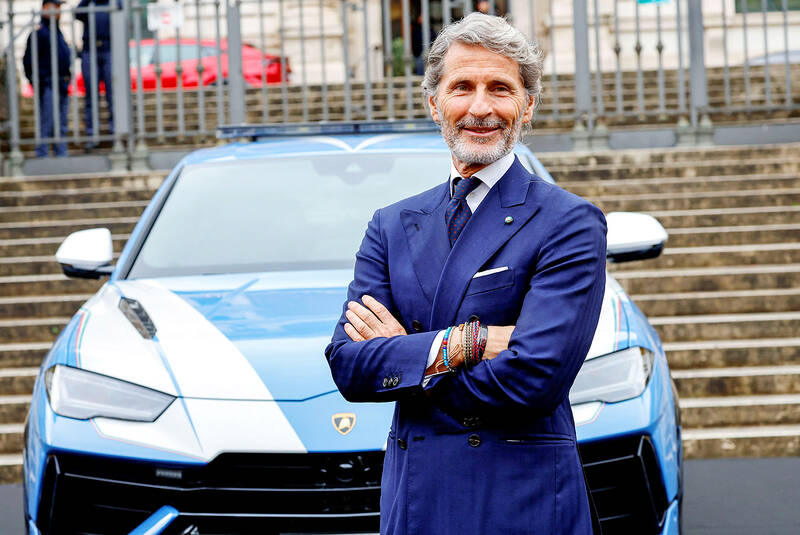Lamborghini SpA is holding off for now on making its roaring sports cars fully electric, as skepticism around the technology grows.
While performance would not be an issue in an electric vehicle, some emotional aspects — such as the sound of the Huracan’s V10 engine — cannot be replicated, Lamborghini CEO Stephan Winkelmann said.
The Volkswagen AG-owned brand also remains open to use e-fuels if regulation becomes more favorable, he said.

Photo: Remo Casilli, Reuters
Fully electric sports supercars “is not something that is selling so far,” Winkelmann said in an interview.
“It’s too early, and we have to see down the road if and when this is going to happen,” Winkelmann added.
It is a tense time in the high-end automotive sector, which is deliberating on how to deal with the regulatory pressure to lower emissions, as demand for electric vehicles slows and governments scale back subsidies for the technology.
Mercedes-Benz Group AG has stopped development of separate underpinnings for electric luxury sedans to save money and plans to sell vehicles running on gasoline longer than expected.
Lamborghini’s rival, Ferrari NV, is further along in its electrification push.
Next month, it plans to open a factory that would make hybrid and electric supercars in Maranello, Italy.
Its first fully electric model is due next year.
BYD Co (比亞迪) has beaten both to the punch after unveiling a 1.68 million yuan (US$236,910) electric sports car in February.
The Yangwang U9 would initially be sold only in China, where Lamborghini’s exposure is “limited,” Winkelmann said.
Lamborghini has had success selling plug-in hybrids, including the Revuelto sports car, but its first fully electric model — the two-door Lanzador crossover — would not arrive until 2028.
Still, the company is overhauling its supply chain and production to produce Lamborghinis with 40 percent fewer carbon dioxide emissions by 2030, Winkelmann said.
When it comes to synthetic fuels, the brand is benefiting from work at Porsche, another luxury auto maker in Volkswagen’s portfolio.
E-fuels could come into greater focus in two years, when the EU reviews its plan to effectively ban new combustion engine car sales by 2035.
“There might be an opportunity if things change,” Winkelmann said.

Intel Corp chief executive officer Lip-Bu Tan (陳立武) is expected to meet with Taiwanese suppliers next month in conjunction with the opening of the Computex Taipei trade show, supply chain sources said on Monday. The visit, the first for Tan to Taiwan since assuming his new post last month, would be aimed at enhancing Intel’s ties with suppliers in Taiwan as he attempts to help turn around the struggling US chipmaker, the sources said. Tan is to hold a banquet to celebrate Intel’s 40-year presence in Taiwan before Computex opens on May 20 and invite dozens of Taiwanese suppliers to exchange views

Application-specific integrated circuit designer Faraday Technology Corp (智原) yesterday said that although revenue this quarter would decline 30 percent from last quarter, it retained its full-year forecast of revenue growth of 100 percent. The company attributed the quarterly drop to a slowdown in customers’ production of chips using Faraday’s advanced packaging technology. The company is still confident about its revenue growth this year, given its strong “design-win” — or the projects it won to help customers design their chips, Faraday president Steve Wang (王國雍) told an online earnings conference. “The design-win this year is better than we expected. We believe we will win

Chizuko Kimura has become the first female sushi chef in the world to win a Michelin star, fulfilling a promise she made to her dying husband to continue his legacy. The 54-year-old Japanese chef regained the Michelin star her late husband, Shunei Kimura, won three years ago for their Sushi Shunei restaurant in Paris. For Shunei Kimura, the star was a dream come true. However, the joy was short-lived. He died from cancer just three months later in June 2022. He was 65. The following year, the restaurant in the heart of Montmartre lost its star rating. Chizuko Kimura insisted that the new star is still down

While China’s leaders use their economic and political might to fight US President Donald Trump’s trade war “to the end,” its army of social media soldiers are embarking on a more humorous campaign online. Trump’s tariff blitz has seen Washington and Beijing impose eye-watering duties on imports from the other, fanning a standoff between the economic superpowers that has sparked global recession fears and sent markets into a tailspin. Trump says his policy is a response to years of being “ripped off” by other countries and aims to bring manufacturing to the US, forcing companies to employ US workers. However, China’s online warriors